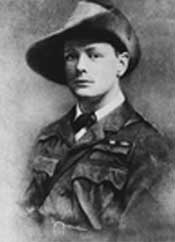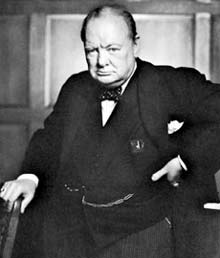Winston Churchill
- Birthdate
- 1874/11/30
- Death date
- 1965/01/24
- Awards
- Nobel Prize for Literature
Biography
Sir Winston Leonard Spencer Churchill is best known for his role as Prime Minister of Britain during World War II. Although he had a primary role in that conflict, he also had an illustrious and successful career as a statesman both before and after the war. His involvement in politics lasted for 64 years, a testament to his enduring popularity and excellent leadership.
Churchill was born into a privileged but not wealthy family, and early on began to make his own way in the world. He did not complete secondary school, but instead graduated from the Royal Military College, and while on leave in 1895 served as a military observer and correspondent during the Spanish-American War in Cuba.
After returning to the British army, he went to India for several years, and in 1899 became a war correspondent in South Africa during the Boer War. Captured as a prisoner of war, Churchill made a daring escape that brought him into the public eye. The proceeds from his memoirs of the experience allowed him to enter Parliament in 1901, initially in the Conservative Party. However, sympathy for the Boer cause and opposition to the new tariff laws of Prime Minister Joseph Chamberlain led him to join the Liberal party in 1904.
Churchill managed to wield a great deal of power during these years; he helped negotiate an end to the Boer War and participated in the creation of the welfare state, which introduced health care and insurance, the minimum wage, and imposed a limit on work hours. Moreover, he was crucial in changing naval ships from coal-burning to oil-fueled, helped form a naval air service, and was involved in the development of the tank.
When World War I broke out in 1914, he immediately joined the naval forces, leading to the failed Dardanelles campaign, an event that seemed to signal the end of his political career: he took full responsibility and resigned. In 1916 he rejoined the army, but soon after was recalled by the new Prime Minister, Lloyd George, and became the Minister of Munitions and later the Secretary of War.
In 1922 Churchill lost his seat in Parliament, but rejoined the Conservative party in 1924, where he served as the Chancellor of the Exchequer. However, he left office in 1929 and spent the next ten years developing his love for painting and writing several books. He also began to predict the danger of an impending war, but was unable to sway the appeasement government of Prime Minister Stanley Baldwin. But Churchill sensed that British involvement in World War II was inevitable and returned to the government as First Lord of the Admiralty. In 1940 he became the Prime Minister and remained in this position for the next five years.
The defeat of France, the Soviet Union’s nonaggression pact with Germany, and the official neutrality of the United States meant that Britain became almost solely responsible for waging war against Hitler. It was during the darkest days when Germany launched a massive aerial bombing campaign, the Battle of Britain, that Churchill’s stubbornness and tenacity became a symbol of the “never say die attitude” of the British people.
Finally, however, in late 1940 Churchill and Britain began to receive assistance from President Franklin Roosevelt and the United States, who provided indispensable aid in the form of naval destroyers, tanks, and weaponry through the policy of lend-lease.
In June 1941 Germany broke its nonaggression pact and invaded the Soviet Union. Later that year, in December, Japan attacked American naval bases at Pearl Harbor, officially drawing the United States into the war. Churchill was quick to see the folly of Germany’s and Japan’s decisions to declare war on the Soviet Union and the United States respectively, and immediately took advantage of these mistakes. He helped form the Grand Alliance comprised of the United States, the Soviet Union, and Britain, and through this coalition was instrumental in the eventual defeat of Nazi Germany.
Before the war ended, Churchill was ousted from power when the Liberal Party won the general elections of 1945. For the next several years, Churchill remained in private life, working on his autobiography, a history of World War II, and his painting. Nevertheless, he remained an influential character in England, frequently speaking out against the spread of communism. In 1951 he was reelected as Prime Minister at the age of 77. He resigned in 1955, but remained a Member of Parliament until 1964.
Churchill died at the age of 90 on 24 January 1965, but not before becoming a Knight of the Garter, an honorary citizen of the United States, and the winner of the Nobel Prize for Literature (1953).


